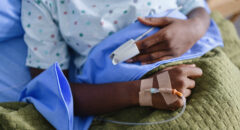
If you have breast cancer, you may be weighing your treatment options. One of those options is radiation therapy, but how much do you really know about radiation therapy and is it something you should consider?
What is radiation therapy?
Radiation therapy, or radiotherapy, is the use of high-energy x-rays to kill cancer cells and shrink tumors. If you have external radiotherapy, the most common radiation approach, the radiation will be aimed directly at your tumor or, if it's after surgery, at the whole breast.
Isn't the radiation dangerous?
Radiation kills healthy cells along with cancer cells, so it is hard on your body, though great care is taken to ensure minimal exposure to your heart or lungs.
The side effects are generally temporary and confined to the breast. Some women worry that radiation can increase their chances of developing other cancers, but the therapy has been shown to be effective enough that its benefits outweigh that risk.
Because radiation may be harmful to a fetus, pregnant women can't receive the treatment. Radiation also is not given to women who have certain connective tissue diseases or those who've received previous radiation therapy to the chest or breast area, such as women with Hodgkin's disease.
RELATED: Essential Life Hacks All Breasties Should Know
Who is a candidate for radiotherapy?
After a lumpectomy, you're likely to get radiation treatments. Depending on the size and extent of the cancer, radiation therapy may target your breast, your chest wall, or the area of your underarm where your lymph nodes are.
You may also have radiation treatments before surgery, to shrink a tumor that will be removed. In most cases, you won't need radiation following a mastectomy.
However, you might need it if your tumor is large, the surgeon took a small margin of tissue from around the tumor, or if the cancer metastasized to the lymph nodes under your armpit.
Depending on what type of surgery you've had, you may be given chemotherapy or hormone therapy before, during, or after your radiation treatment. Sometimes radiation and chemo work better together than either would alone.
For women whose breast cancer has metastasized to other areas, radiation can be used to relieve pain, most commonly for bone metastases (cancer that has spread to the bone). The side effects depend on what part of the body is being treated. A course of radiation for pain control usually involves daily treatment for one to four weeks and can provide enormous pain relief.
How is radiotherapy done?
You will need to see a radiotherapist or radiation oncologist, physicians trained in administering the treatments. External radiation therapy is usually administered five days a week for about seven weeks, starting about a month after your surgery.
For some women, doctors offer accelerated radiation, which involves slightly larger daily doses for only three weeks; in some cases, women have radiation twice a day for one week.
Before the therapy begins, your doctor will take some x-rays to find out exactly where the tumor is in relation to vital organs such as your heart and lungs, which are affected by exposure to radiation. Before your first treatment, you'll have to stand or sit perfectly still for about half an hour while your breast is measured and x-rayed and the settings on the equipment are established. You'll likely get many small tattoos on your breast, no bigger than the head of a pin, to mark the exact spot to be irradiated and other landmarks so that the radiation can be given accurately each treatment session.
Some women say the hardest part of the whole process is holding still for the measurements. After that, you lie down on a table and the machine that delivers the radiation is set up above you. You should hear it, but just as in any other x-ray procedure, you won't feel a thing during the 10-minute treatment.
Radiation can cause something that feels like a bad sunburn, redness in the breast, and fatigue. Loss of appetite, nausea, or diarrhea are possible but rare. You may also tire easily during your course of therapy, especially after a few weeks. You may be weighed occasionally when you come in for treatments, to make sure you aren't losing too much weight.
Other potential side effects include heaviness, hardness, or swelling of the breast and a sunburned appearance that eventually goes away. Temporarily, your breasts may be larger (if you're retaining fluid) or smaller (if tissue changes have occurred), and they may feel more or less sensitive. If your lymph nodes are being irradiated, you may develop lymphedema, or swelling of the arm due to scarring or inflammation of your lymph nodes, which can be quite uncomfortable.
Radiation to the chest may result in a cough, shortness of breath, or difficulty swallowing. If any of these side effects occur, be sure to tell your doctor.
Because radiation may cause your skin to be sensitive, try to go without wearing a bra whenever possible -- or wear a soft cotton bra without an underwire to reduce the risk of irritation. Avoid exposing the treated area to sunlight. Ask your doctor before using any lotions or powders that might irritate your skin.
Brachytherapy is another form of radiation in which radioactive seeds are placed into the breast tissue next to the cancer. It is sometimes given in conjunction with external beam radiation to add an extra dose of radiation to the tumor.
RELATED: A Breastie’s Guide to Loving Your Bones
Talking with your doctor
Doctors have safely and effectively used radiation therapy to treat cancer for more than 100 years. However, as with most treatments, there are side effects, including a slight risk for developing a second cancer.
Talk with your healthcare team about what to expect and what you are experiencing during and after your treatment. He or she can help you make an educated decision on what is best for your treatment plan.
Cancer.net suggests asking these questions if your doctor recommends radiation therapy:
- What type of radiation therapy is recommended for me? Why?
- What is the goal of having radiation therapy? Is it to eliminate the cancer, help me feel better, or both?
- How long will it take to have this treatment? How often will I have radiation therapy?
- Will I need to get a mesh mask or support made before my treatment begins? Can you describe this process?
- Where will I receive radiation therapy?
- What short-term side effects can I expect during radiation therapy?
- What can be done to relieve side effects I experience?
- Who should I talk with about any side effects I experience? How soon?
- How will this treatment affect my daily life? Will I be able to work, exercise, and perform my usual activities?
- What are the possible long-term side effects of this type of radiation therapy?
- Whom should I call with questions or problems?
- How can I reach them during regular office hours? After hours?
- If I'm very worried or anxious about having this treatment, what can I talk with?
- If I'm worried about managing the cost of this treatment, who can help me?
- Will special precautions be needed to protect my family and others from radiation therapy I receive?
- Will I receive other cancer treatments in addition to radiation therapy?
- When will we know if this treatment was successful? How?









